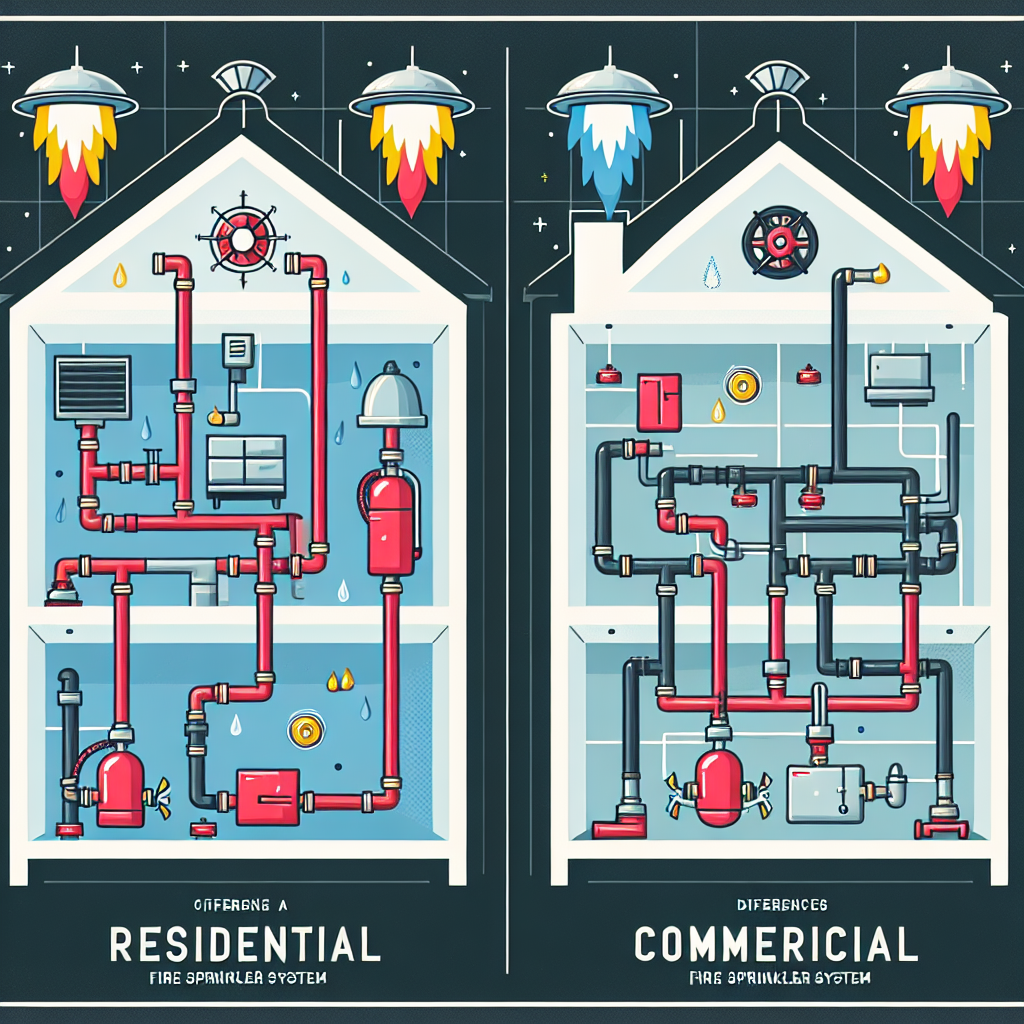When it comes to fire safety, one of the most effective measures is the installation of fire sprinkler systems. These systems act as an early warning and suppression mechanism, saving lives and property. However, residential and commercial fire sprinkler systems are designed to meet different needs and requirements. In this article, we explore the key distinctions between these two types of systems, helping homeowners and business owners make informed decisions.
What Are Fire Sprinkler Systems?
Fire sprinkler systems are automated firefighting devices that are activated by heat or flames. They are designed to distribute water to control or extinguish a fire in its early stages. Whether in a home or a commercial space, fire sprinkler systems serve as a vital defense against fire hazards.
Residential Fire Sprinkler Systems: Protecting Homes
Overview of Residential Systems
Residential fire sprinkler systems are specifically designed for homes, apartments, and similar living spaces. They adapt to various layouts and sizes, ensuring that every corner of a home is adequately protected.
Components of Residential Systems
Typically, residential systems include the following components:
- Heads: The spray nozzles located throughout the home; each applies water when activated.
- Pipes: Dedicated piping that transports water to the sprinkler heads.
- Water Supply: A connection to the municipal water supply or a well.
Benefits of Residential Fire Sprinkler Systems
-
Life-Saving Protection: In homes, the primary goal of fire sprinklers is to protect lives. Studies show that homes with sprinklers have significantly lower fire-related fatalities.
-
Property Preservation: Residential sprinklers can minimize the damage caused by fire, often allowing homes to be repaired instead of entirely rebuilt.
-
Insurance Discounts: Many insurance companies offer discounts to homeowners who install fire sprinkler systems, making it a cost-effective safety investment.
- Peace of Mind: Knowing that you have an advanced fire protection system in place provides reassurance to families, enhancing their overall sense of security.
Commercial Fire Sprinkler Systems: Safeguarding Businesses
Overview of Commercial Systems
Commercial fire sprinkler systems cater to larger facilities such as offices, factories, and warehouses. These systems are more complex, designed to handle greater fire risks associated with larger building sizes and diverse operations.
Components of Commercial Systems
Commercial fire sprinkler systems commonly include:
- Multiple Heads: Strategically placed to cover expansive areas.
- Advanced Piping: Designed to handle high-pressure water flow.
- Fire Alarm Integration: Often connected to fire alarm systems for comprehensive fire safety.
Benefits of Commercial Fire Sprinkler Systems
-
Comprehensive Coverage: Commercial systems can be tailored to specific building layouts, ensuring all areas—including storage, manufacturing, and public spaces—are effectively protected.
-
Reduced Liability: By investing in a robust fire sprinkler system, businesses mitigate risks and protect themselves from potential lawsuits related to fire incidents.
-
Regulatory Compliance: Many jurisdictions require commercial businesses to adhere to strict fire safety regulations. Installing a fire sprinkler system can bring a business into compliance with local fire codes.
- Operational Continuity: Effective fire suppression can help prevent significant business interruptions, allowing companies to resume normal operations swiftly after a fire incident.
Key Differences Between Residential and Commercial Fire Sprinkler Systems
Design and Complexity
While both systems aim to save lives, residential fire sprinklers are simpler and designed for smaller spaces. Commercial fire sprinklers incorporate sophisticated technology to handle large areas and varying resources.
Installation Requirements
Installation of residential systems typically conforms to local building codes with less bureaucratic oversight. Conversely, commercial systems often require detailed studies, plans, and approvals due to the complexities and larger scopes.
Cost Factors
The cost of installation and maintenance varies significantly. Residential fire sprinkler systems usually require a lower initial investment, while commercial systems can be more expensive due to their scale, technology, and compliance needs.
Conclusion: Choosing the Right System for Your Needs
Fire safety is non-negotiable in any setting, be it residential or commercial. Understanding the differences between fire sprinkler systems can empower homeowners and business leaders to make the best decision for their safety. By investing in the right fire sprinkler system, you are not merely meeting regulations; you are ensuring the safety of lives, preserving property, and promoting peace of mind.
Whether you’re a homeowner looking to protect your family or a business owner safeguarding your investments, the choice of a fire sprinkler system should be made with careful consideration. Always consult with a qualified fire protection professional to assess your specific needs and determine the best system for your situation. After all, the best time to ensure fire safety is before a fire occurs.
Keywords for SEO Optimization
- Residential fire sprinkler systems
- Commercial fire sprinkler systems
- Fire safety
- Fire protection
- Sprinkler system installation
- Fire suppression systems
- Home fire safety
- Business fire safety
By effectively understanding and addressing these distinctions, you can take proactive steps toward optimal fire safety for your home or business. Ensure you are protected; after all, safety is priceless.


